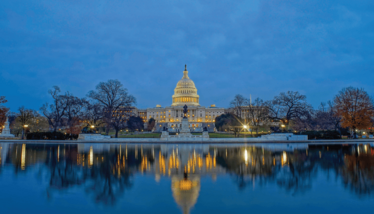Lobby and Legislature Play Pricing Plan Ping Pong
A frantic duel between government ambitions and industry interest ended in a compromise that brought dissident Democrats back in line and the party leadership’s policy back from the brink of nonexistence
Curveballs, spin, and point-scoring marked Halloween at the center of American political power this year, as Joe Biden’s administration struggled to get its proposed drug pricing policy onto the table and past its opponents.
The plan to grant Medicare greater powers to negotiate drug prices began as just one part of the administration’s “Build Back Better” agenda – a package of reform and infrastructure investments aiming to revitalize a distressed and fragmented post-COVID-19 America.
However, the policy quickly faltered when a selection of Democrats stepped out of line to oppose the plans. Controlling only 50 of the US Senate’s 100 seats (plus the tie-breaking vote of Vice President Kamala Harris) and facing a unified Republican opposition, Biden’s Democrats could afford exactly zero defections.
In a subsequent announcement of the $1.75 trillion “Build Back Better” social spending plan, President Biden dropped all mention of plans for drug pricing controls or federal price-negotiating power. In response, media commentators and progressive figures within the Democratic party pinned blame for the plan’s failure on donations and payments made by large numbers of industry lobbyists working within Washington DC.
Shortly after Biden made his announcement, it was reported that following talks with dissenting Arizona Democrat Krysten Sinema, the administration had reached an agreement regarding prescription drug pricing that aligned with a lighter proposal from representatives Scott Peters and Kurt Schrader.
Sinema, Peters, and Schrader are all major recipients of major industry donations; however, each has argued their own intellectual case against the originally proposed reforms. Peters insisted his motivation was to protect pharmaceutical jobs and interests in his San Diego District, remarking, “You don’t make public policy based on polls,”. Across the hall, progressive Democrats made their dissatisfaction clear. One such figure, Senate Budget Chair Bernie Sanders tweeted, “You can walk into the pharmacy today for a refill of the exact same medicine you’ve used for 10 years, and the price could be DOUBLE what it was when you got your last refill. And there's nothing you can do about it — unless Congress summons the courage to end Big Pharma’s greed.”
The result? A deal has finally been reached. Following an endorsement from Sinema, the backing of all 50 senate Democrats settled the issue. A new policy will allow Medicare to negotiate the price for 10 of the most expensive drugs by 2025, and 20 by 2028, with certain exceptions for small biotech companies. Drugs would only be on the table for price negotiation after passing their initial exclusivity period of 9 or 12 years, and companies unwilling to haggle would be subject to an excise tax.
Reactions to the final compromise were mixed. Speaking to the press, Senate Majority Leader Chuck Schumer said, “Many of us would have wanted to go much further, but it's a big step in helping the American people deal with the price of drugs.” Offering similar thoughts, Senate Majority Whip Dick Durbin said, “I would prefer a much stronger version, but I don’t want to end up empty handed."
Others on both sides of the court were less pleased. The Pharmaceutical Research and Manufacturers of America described the policy as “disastrous,” claiming it “threatens innovation and makes a broken health care system even worse.” Similarly explosive language came from advocacy group Public Citizen, who tweeted: “It is utterly infuriating that certain politicians get the label ‘centrist’ or ‘moderate’ despite blocking an agenda favored by an overwhelming majority of actual, you know, human beings.”
But, for all the sound and fury on either side, the reform looks set to march right down the middle – and then on to the next game of ping pong.
Between studying for my English undergrad and Publishing master's degrees I was out in Shanghai, teaching, learning, and getting extremely lost. Now I'm expanding my mind down a rather different rabbit hole: the pharmaceutical industry. Outside of this job I read mountains of fiction and philosophy, and I must say, it's very hard to tell who's sharper: the literati, or the medicine makers.




















